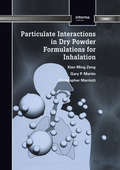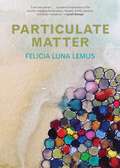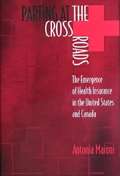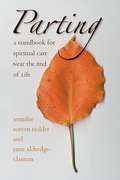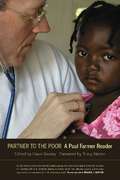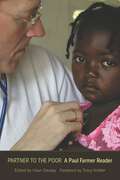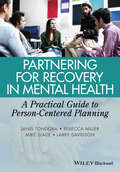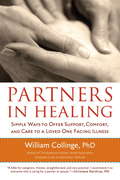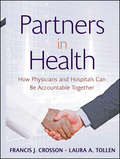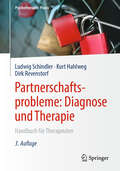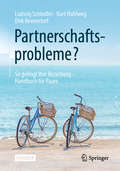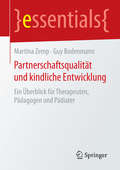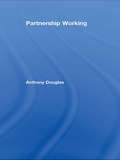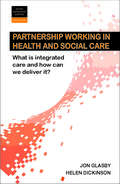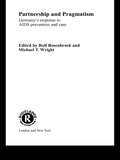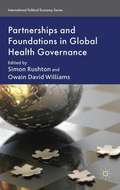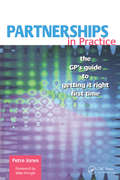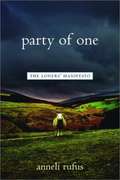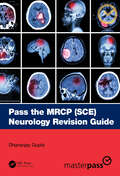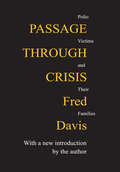- Table View
- List View
Particulate Interactions in Dry Powder Formulation for Inhalation
by Xian Ming Zeng Gary Peter Martin Christopher MarriottInteractions between drug particulates are crucial in determining drug dispersion and deaggregation, and ultimately delivery efficiency. This book combines principles and factors in pharmaceutical powder technology, critically reviews some of the studies carried out in dry powder formulation development, and proposes possible strategies for improvi
Particulate Matter
by Felicia Luna LemusIn concise and distilled prose, Lemus presents a collection of still lifes, landscapes, and portraits of a challenging year that threatened all she loved most. "There are only a few words per page in Particulate Matter, but that
Partikelemissionskonzept und probabilistische Betrachtung der Entwicklung von Infektionen in Systemen: Dynamik von Logarithmus und Exponent im Infektionsprozess, Perkolationseffekte
by Marcus HellwigDas Buch beschreibt die Möglichkeit, eine probabilistische Prognose zu erstellen, die den mittleren n-Tage-Logarithmus von Fallzahlen in der Vergangenheit verwendet, um einen Exponenten für eine Wahrscheinlichkeitsdichte für eine Prognose zu bestimmen, als auch das Partikelemissionskonzept, das sich herleitet aus Kontakt- und Verteilungsrate, welche den Exponenten der voraussichtlichen Entwicklung in dem Maß erhöht wie sich eine Gruppenbildung von Personen bilden kann.
Parting at the Crossroads: The Emergence of Health Insurance in the United States and Canada
by Antonia MaioniAs almost all newspaper or magazine readers know, Canada figured prominently in the turbulent U. S. debates over health care reform in the early Clinton presidency. Furthermore, future news analysts and policymakers will undoubtedly again use Canada to cite the "good" and the "bad" aspects of single-payer national health insurance. Beyond the debate about the desirability of Canadian-style health care reforms, Antonia Maioni sees another question: Why did the United States and Canada, alike in so many ways, part "at the crossroads" to produce such different systems of health insurance? She answers this previously neglected query so interestingly that her book will hold the attention of anyone concerned with health care in either country or both. The author explores the development of health insurance in the United States and Canada, from the emergence of health care as a political issue in the 1930s to the passage of federal health insurance legislation in the 1960s. Focusing on how political institutions influence policy development, she shows that Canada's federal structure and its parliamentary institutions encouraged a social-democratic third party that became pivotal in demonstrating the feasibility of universal, public health insurance. Meanwhile, the constraints of the U. S. political system forced health care reformers to temper their own ideas to appeal to a wide coalition within the Democratic party. Even readers previously unfamiliar with Canadian politics will find in this book important clues about the "realm of the possible" in the uncertain future of U. S. health care.
Parting: A Handbook for Spiritual Care Near the End of Life
by Jennifer Sutton Holder Jann Aldredge-ClantonAt times we may be called to be companions on a journey we would rather not take--the journey of a loved one toward the end of life. For those who choose to serve as close companions of terminally ill relatives or friends, Parting offers the collective wisdom of people from many cultures and faith traditions as a "travel guide" for meaningful companionship--helping someone toward a peaceful transition from this life. Sections of the book discuss how to cross the bridge from ordinary conversation to spiritual reflection; how to provide comforts for the body, mind, and soul; and how to care for yourself while concentrating on the needs of another. Transcending any specific religion or culture, this handbook addresses universal spiritual needs.Designed for easy reading by weary travelers, this practical, pocket-sized guide prepares the spiritual companion for an enriching experience, even on the journey toward life's end. It is an indispensable tool for family members and friends, hospice workers, religious leaders, counselors, and medical providers.
Partner Violence
by Zeev WinstokAs domestic violence continues to be a focus of social and psychological concern, two basic contradictory viewpoints endure: one rooted in male power dynamics, the other maintaining that both genders use and are victimized by violence. Although both sides have their merits, neither has adequately answered the crucial question: What causes conflict to escalate into violence? Partner Violence: A New Paradigm for Understanding Conflict Escalation adds a third, escalation-focused paradigm to the debate, addressing the limitations of the two dominant perspectives in a comprehensive scholarly approach. This concise yet comprehensive volume examines key gender- and non-gender-related violence issues and sets out a compelling behavioral argument that using violence to control others is a rational choice. Its theoretical and empirical foundations support an in-depth study of escalating aggression in violent relationships, both throughout periods of chronic conflict and in single violent episodes. This analysis promotes a broader and deeper understanding of partner violence, suitable to developing more finely targeted, effective, and lasting interventions. Among the key topics featured are: Gender differences in aggressive tendencies. Dominance, control, and violence. Partner violence as planned behavior. The process leading to partner violence. Partner conflict dynamics throughout relationship periods and within conflicts. Gender differences in escalatory intentions. Partner Violence is an important volume for researchers, graduate students, and clinicians/professionals across various disciplines, including personality and social psychology, criminology, public health, clinical psychology, sociology, and social work.
Partner to the Poor: A Paul Farmer Reader
by Haun Saussy Paul FarmerThis book illuminates the depth and impact of anthropologist and physician Paul Farmer's contributions and demonstrates how, over time, this unassuming and dedicated doctor has fundamentally changed the way we think about health, international aid, and social justice.
Partner to the Poor: A Paul Farmer Reader (California Series in Public Anthropology #23)
by Paul FarmerFor nearly thirty years, anthropologist and physician Paul Farmer has traveled to some of the most impoverished places on earth to bring comfort and the best possible medical care to the poorest of the poor. Driven by his stated intent to "make human rights substantial," Farmer has treated patients—and worked to address the root causes of their disease—in Haiti, Boston, Peru, Rwanda, and elsewhere in the developing world. In 1987, with several colleagues, he founded Partners In Health to provide a preferential option for the poor in health care. Throughout his career, Farmer has written eloquently and extensively on these efforts. Partner to the Poor collects his writings from 1988 to 2009 on anthropology, epidemiology, health care for the global poor, and international public health policy, providing a broad overview of his work. It illuminates the depth and impact of Farmer’s contributions and demonstrates how, over time, this unassuming and dedicated doctor has fundamentally changed the way we think about health, international aid, and social justice.A portion of the proceeds from the sale of this book will be donated to Partners In Health.
Partnering for Recovery in Mental Health
by Rebecca Miller Mike Slade Janis Tondora Larry DavidsonPartnering for Recovery in Mental Health is a practical guide for conducting person and family-centered recovery planning with individuals with serious mental illnesses and their families. It is derived from the authors' extensive experience in articulating and implementing recovery-oriented practice and has been tested with roughly 3,000 providers who work in the field as well as with numerous post-graduate trainees in psychology, social work, nursing, and psychiatric rehabilitation. It has consistently received highly favorable evaluations from health care professionals as well as people in recovery from mental illness.This guide represents a new clinical approach to the planning and delivery of mental health care. It emerges from the mental health recovery movement, and has been developed in the process of the efforts to transform systems of care at the local, regional, and national levels to a recovery orientation. It will be an extremely useful tool for planning care within the context of current health care reform efforts and increasingly useful in the future, as systems of care become more person-centered. Consistent with other patient-centered care planning approaches, this book adapts this process specifically to meet the needs of persons with serious mental illnesses and their families.Partnering for Recovery in Mental Health is an invaluable guide for any person involved directly or indirectly in the provision, monitoring, evaluation, or use of community-based mental health care.
Partnering with Parents
by Barry Trute Diane Hiebert-MurphyInternationally recognized as the gold standard in providing services to children with special needs and their family members, family-centred practice has developed substantially over the past two decades. However, there has not been until now a basic practice text for guiding professional education and skill building across diverse areas. Filling this significant gap, Partnering with Parents is a primer on family-centred practice for professionals working in children's health and developmental services.The material in this textbook spans interdisciplinary training across key child service sectors (particularly child development, child mental health, and children's health). The authors identify and discuss the key principles of the model as it is practiced in Canada, with a focus on working alliances, empowerment methods, and the development of social support resources. Providing examples of the application of family-centred practice in a wide range of service settings, Partnering with Parents will be useful for the social workers, nurses, psychologists, and allied health professionals who work together in complex service situations.
Partnering with Patients to Drive Shared Decisions, Better Value, and Care Improvement: Workshop Proceedings
by Roundtable On Value Science-Driven Health CareThe Institute of Medicine\'s Roundtable on Value & Science-Driven Health Care held a workshop, titled Partnering with Patients to Drive Shared Decisions, Better Value, and Care Improvement, on February 25 and 26, 2013. The workshop, supported by the Gordon and Betty Moore Foundation and the Blue Shield of California Foundation, focused on identifying and exploring issues, attitudes, and approaches to increasing patient engagement in and demand for the following: shared decision making and better communication about the evidence in support of testing and treatment options; the best value from the health care they receive; and the use of data generated in the course of their care experience for care improvement. The workshop hoped to build awareness and demand from patients and families for better care at lower costs and to create a health care system that continuously learns and improves. Participants included members of the medical, clinical research, health care services research, regulatory, health care economics, behavioral economics, health care delivery, payer, and patient communities. Partnering with Patients to Drive Shared Decisions, Better Value, and Care Improvement Workshop Proceedings offers a summary of the 2-day workshop including the workshop agenda and biographies of speakers.
Partners in Healing: Simple Ways to Offer Support, Comfort, and Care to a Loved One Facing Illness
by William CollingeThis book offers a new sense of empowerment for the intimate partners of people living with serious health problems. Collinge draws on cutting-edge scientific research along with his experience counseling couples facing serious illness to offer a range of insights, strategies, and techniques that caregivers can utilize to promote their partners' physical and emotional well-being--while also promoting their own. Topics include: * The importance of self-care for the caring partner * Ways of involving family and friends in a network of support * Simple massage and touch techniques to bring comfort and reduce symptoms * How open, affirmative communication can contribute to healing * Basic energy-healing techniques to promote well-being
Partners in Health
by Null Crosson Francis J. Tollen Laura A.Praise for Partners in Health "The combination of visionary leadership, knowledge, and superb timing makes this book a winner. Health care is evolving toward collaboration and integration, and this book is essential reading for anyone wishing to change the relationships between hospitals and physicians. " -Donald W. Fisher, PhD, president and CEO, the American Medical Group Association "This book is a must-read for anyone committed to a high-performance health system. It spells out the practical steps that will move us toward an accessible, coordinated, patient-centered system of care. Its recommendations for payment and regulatory reform underscore the urgency of comprehensive health reform if the current misaligned incentives are to be changed to support those on the frontlines in providing the best care with prudent stewardship of resources. " -Karen Davis, PhD, president, The Commonwealth Fund "Closer physician-hospital integration would lead to higher quality care at lower cost. Partners in Health is a masterful guide to past integration efforts, current models of success, and thoughtful recommendations for future progress. " -Victor R. Fuchs, PhD, Henry J. Kaiser Jr. Professor Emeritus, Stanford University "The working relationship of hospitals and physicians must be restructured for the United States to achieve more efficient, accountable care. But addressing our urgent challenges can't wait for all hospitals and physicians to join highly structured systems. Thankfully, the authors offer steps that all the major stakeholders can take today to spur new models and start the flywheel of trust spinning at new speeds. " -Richard Umbdenstock, president and CEO of the American Hospital Association "Transitioning U. S. health care from fragmentation to integration, in the context of a more rational payment system, is sure to be a long and tortuous journey. Partners in Health is a kind of Fodor's Guide to the voyage. No one committed to health reform should travel without it. " -Susan Dentzer, editor-in-chief, Health Affairs
Partnerschaftsprobleme: Handbuch für Therapeuten (Psychotherapie: Praxis)
by Dirk Revenstorf Ludwig Schindler Kurt HahlwegDas Therapieprogramm: Partnerschaftsprobleme nehmen in der therapeutischen Praxis immer mehr Raum ein. Sie wirken sich direkt auf die allgemeine Lebenszufriedenheit aus und können Ursache für neurotische, psychosomatische und psychiatrische Störungen sein. Daher ist das Interesse an Ehe- und Partnerschaftstherapie weiterhin stark angewachsen. Ausgehend vom aktuellen theoretischen Stand der Ehe- und Paartherapie schildern die Autoren praxisnah und verständlich ein umfassendes Therapieprogramm, das nicht zuletzt auf das Training von Kommunikationsfertigkeiten der Paare fokussiert ist.
Partnerschaftsprobleme?: So gelingt Ihre Beziehung - Handbuch für Paare
by Dirk Revenstorf Ludwig Schindler Kurt HahlwegEine glückliche Partnerschaft ist von zentraler Bedeutung für unser Wohlbefinden und wirkt sich unmittelbar positiv auf viele andere Lebensbereiche aus. Umgekehrt rauben uns Beziehungsprobleme in hohem Maße Energie und Lebenskraft. Es gibt kaum eine langjährige Beziehung ohne kritische Momente. In solchen schwierigen Phasen ist es entscheidend, nicht vorschnell aufzugeben. Mit vielen Beispielen und konkreten Anregungen hilft dieses Arbeitsbuch Paaren, ihre persönlichen Herausforderungen Schritt für Schritt zu bewältigen. Aus dem Inhalt: Liebe und Bindung - Geben und Nehmen - Wie sage ich es? - Wie nehme ich es auf? - Wie lösen wir Konflikte? - Wie setzen wir Absprachen um? - Streit minimieren - Die 10 Gebote der Beziehungspflege. Die Autoren: Prof. Dr. Ludwig Schindler, Universität Bamberg. Prof. Dr. Kurt Hahlweg, Technische Universität Braunschweig. Prof. Dr. Dirk Revenstorf, Universität Tübingen.
Partnerschaftsqualität und kindliche Entwicklung: Ein Überblick für Therapeuten, Pädagogen und Pädiater (essentials)
by Martina Zemp Guy BodenmannInternationale Befunde haben konsistent dargelegt, dass destruktive Paarkonflikte und Scheidungen zu den wichtigsten Risikofaktoren für eine ungünstige kindliche Entwicklung gehören. Für Kinder sind Störungen in der Partnerschaft der Eltern in hohem Maße bedrohlich und gehen im Falle einer Trennung der Eltern mit dem schmerzvollen Bruch des bisherigen Lebensentwurfs einher. Dies bedeutet in aller Regel ein hoch destabilisierendes Ereignis, welches von Kindern vielgestaltige Anpassungsleistungen abverlangt. Ermutigenderweise hat die gegenwärtige Paar- und Familienforschung Bedingungen identifiziert, wie Paarkonflikte und Scheidungen möglichst konstruktiv verlaufen - um der Partnerschaft und des Kindeswohls willen.
Partnership Working
by Anthony DouglasPartnership working is recognised as the most effective way of improving social care services, and a non-negotiable part of the government’s aim is to provide a seamless care service. However, for students undertaking placements or for more experienced professionals moving to a different service area, the question is: what does it mean in practical terms? This book is both an introduction and an in-depth analysis of partnership working across the public sector in the UK. In a comprehensive discussion of partnership working, Anthony Douglas explores: The history of partnership working, its theoretical base and practical applications Why partnership working is important How professionals are already working together How to develop good partnerships and address common difficulties How to ensure that partnership working really does result in better practice The future of partnership working The analysis and examples range across the whole of the public sector with a primary focus on social care. Drawing on up-to-date research evidence and using plenty of practical examples and thinking points, Partnership Working will be of interest to students and researchers at all levels and practitioners and managers of front-line services.
Partnership Working 2e: What is Integrated Care and How Can We Deliver It? (Better Partnership Working series)
by Helen Dickinson Jon GlasbyUK health and social care are increasingly being asked to work together across traditional agency boundaries. Although this sounds easy in theory, doing it in practice is complicated and difficult. In many cases, moreover, current training programmes, research and textbooks are even more divided than front-line services, and practitioners and managers are often being given the task of making partnerships work without the necessary support. Against this background, the second edition of this bestselling book provides a concise 'warts and all' introduction to partnership and integration, summarising updated references to current policy and research, setting out useful frameworks and approaches, and helping policy makers and practitioners to work more effectively together, with greater emphasis on ‘integrated care’. Written by the leading authors in the field and fully updated since the Health and Social Care Act 2012, the book is also fully evidence- and research-based, while still being accessible and applicable to everyday practice. Aimed at students, practitioners, managers and policy makers in health and social care, and including new reflective exercises and boxed examples, this is still the one book that everyone in the field should read.
Partnership and Pragmatism: The German Response to AIDS Prevention and Care (Social Aspects of AIDS)
by Michael T. Wright Rolf RosenbrockThis book provides a comprehensive overview of the most important themes in German HIV/AIDS prevention and care from the beginning of the epidemic to the present. Multidisciplinary in approach, it highlights the unique contributions of Germany to AIDS work, making available for the first time knowledge which can be applied to other countries as well as to other fields of public health practice. Topics discussed include: *structural prevention, a concept which unites political and behavioural change *the synchronistic relationship between AIDS policy and gay politics *the dominance of love and intimacy over other 'risk factors' *an approach to prevention among drug users which emphasis human rights and accepts the using behaviour *a unique partnership between public authorities and the voluntary sector *services for women working in cross-national border prostitution *an AIDS survivor syndrome among gay men *HIV in the context of emotional risks taken by women in relationships. In addition, specifically German themes are described, including special needs of gay men from the former East Germany, the difficulties of providing adequate outpatient care for people with HIV/AIDS and the history of the AIDS prevention debate in Germany. The book offers medical, nursing, public health, sociological, psychological and social work perspectives on the German response to AIDS.
Partnership for Excellence
by Edward ShorterThe University of Toronto's Faculty of Medicine is North America's largest medical school and a major health consortium, boasting nine affiliated teaching hospitals and a network of research institutes. It is where insulin was pioneered, stem cells were first discovered, and famous physicians from Vincent Lam to Sheela Basrur began their careers. But despite all its major accomplishments, the faculty's impressive history has never before been comprehensively documented.In Partnership for Excellence, senior medical historian and award-winning author Edward Shorter details the Faculty of Medicine's history from its inception as a small provincial school to its present day status as an international powerhouse. Deeply researched through front-line interviews and primary sources, it ties the story of the faculty and its teaching hospitals to the general history of medicine over this period. Shorter emphasizes the enormous concentration of intellectual energy in the faculty that has allowed it to become the dominant force in Canadian medicine, home to a legion of medical pioneers and achievements.
Partnerships and Foundations in Global Health Governance
by Simon Rushton Owain David WilliamsThis book argues that the new actors in global health constitute a 'private turn' in global health governance, and provides theoretical and practical grounds for viewing global health partnerships and philanthropic foundations as closely aligned in their ideational and material approaches to a range of important issues and crises.
Partnerships in Practice: The GP's Guide to Getting it Right First Time
by Petre JonesMedical partnerships are highly complex legal and financial entities. This book navigates the reader through the key issues and deals with the less tangible aspects such as partnership dynamics and organisational behaviour. Examples illustrate common difficulties and offer possible choices. It is clear, practical and readable and essential for all GPs entering a partnership. It is also relevant for GPs currently in partnerships, practices considering their partnership deed, Senior House Officers and GP registrars.
Party of One: The Loners' Manifesto
by Anneli RufusA celebration of the "loner" reassesses the cultural revulsion heaped on this type--a group with members as diverse as Rene Descartes, Emily Dickinson, and Greta Garbo--and re-evaluates its role in society.
Pass the MRCP (MasterPass)
by Dhananjay GuptaThis up-to-date revision guide for the MRCP SCE (Membership of the Royal College of Physicians—Specialty Certificate Examination) in neurology covers the core areas essential for exam success. The chapters are structured to align with the exam syllabus and help exam candidates learn and recall core concepts.The chapter format and style provide a structured and focused approach to studying essential neurology topics, ensuring a comprehensive understanding of the subject matter. Carefully curated content encompasses all areas tested in the MRCP (SCE) Neurology examination. The use of bullet points, tables and colour illustrations aids in easy assimilation of information. The inclusion of neuroradiology and neuropathology, which account for a significant section of exam questions, is a particular strength of this text.Whether you are a resident or trainee preparing for your first SCE examination or a seasoned neurologist seeking to enhance your knowledge and skills, this book will provide you with the necessary tools for success.
Passage Through Crisis: Polio Victims and Their Families
by Fred DavisBased on a study of fourteen families in which a child had contracted paralytic poliomyelitis. Passage Through Crisis: Polio Victims and Their Families, first published in 1963, was widely praised for its penetrating--and, for its time, innovative--analyses of doctor-patient communications, and for its interpreta-tion of the meaning of physical disability in American society. In his new opening essay, Davis reflects on the enduring sources of this profound problem in human relations as well as on those changes in the culture of American health care that are helping to restructure doctor-patient relations along more open, less authoritarian lines. The emergence of patient self-help groups, the political militancy of the Gay community in regard to AIDS, and the fading of the early post-World War II naive faith in the humanitarian efficacy of science are some of the developments dealt with. A parallel discussion of the importation into medical sociology of such concepts as the reality-structuring power of professional discourse and of the meta-phoric significance of different diseases for different historical eras seeks to relate developments in the culture of health care to sociology's study. Passage Through Crisis retains for today's readers that essential quality that most engaged readers of a quarter century ago: its vivid and probing ethno-graphic account of the impact of serious illness on the family, the difficult processes of adjustment that ensue and, in these connections, the role played (and toll exacted) by American values.
